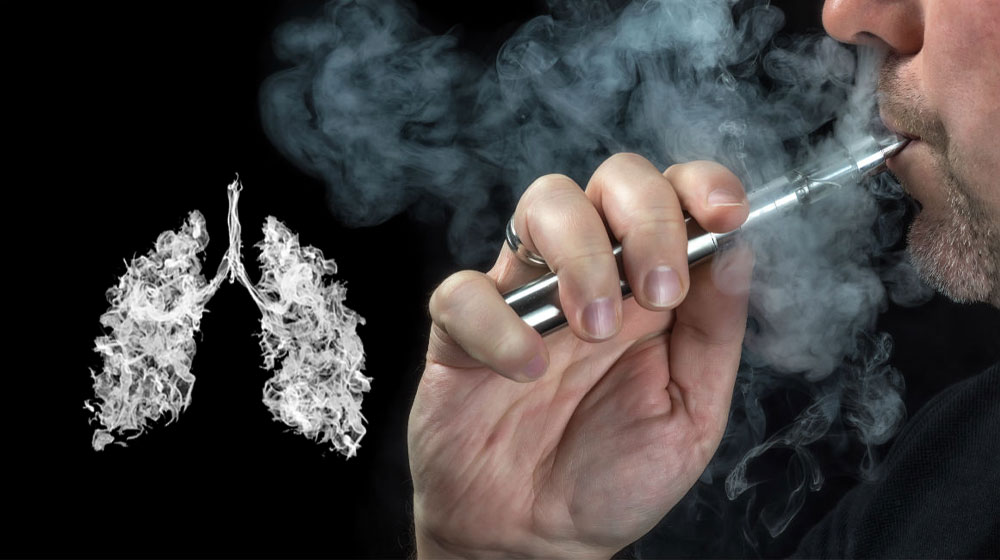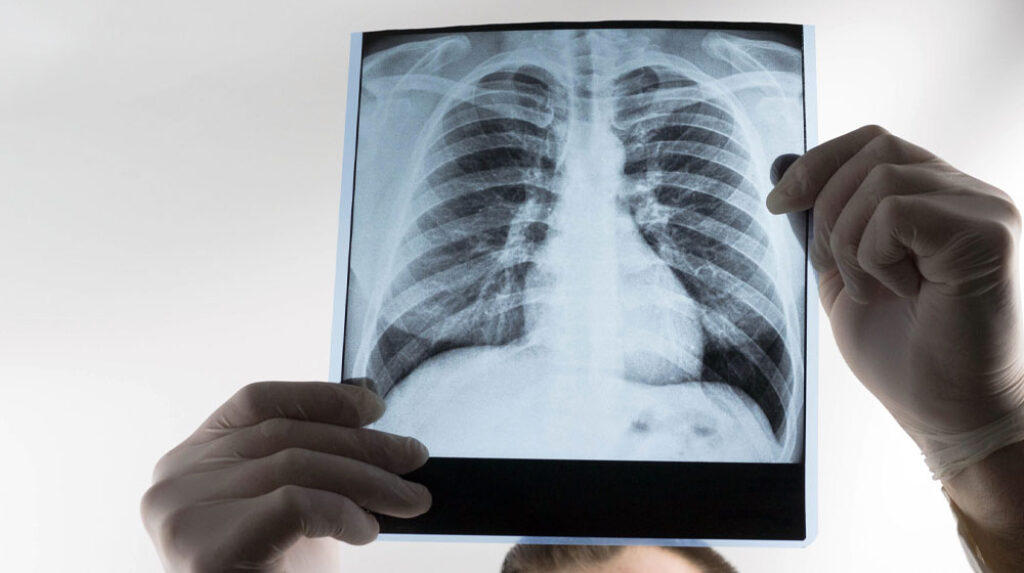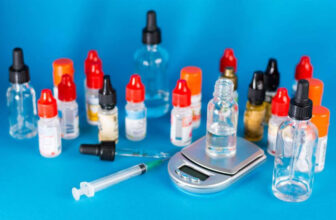
As the popularity of vaping and vapes continues to grow, so does the debate over their safety. Thousands of people have turned to these gadgets for their nicotine fixes, hoping to decrease their exposure to the bad chemicals in traditional cigarettes. This has led many people to question whether or not vaping is the best alternative to smoking, do vapes cause cancer? In this blog post, we will explore the health implications of vapes or vaping, including its connection to cancer.
The components of vape
The important components of vapes include base liquids, flavors, and nicotine content. Understanding these individual parts can help shed light on the possible health dangers linked with vaping.
Base liquids
E-liquids of a base liquid made up of vegetable glycerin or propylene glycol, referred to as VG and PG, respectively. These substances are usually considered safe by the FDA and are generally used in food, pharmaceutical products, and cosmetics. Anyway, their inhalation is being warmed can be harmful.
Nicotine content
Nicotine is the initial addictive substance found in vapes and cigarettes. E-liquids can contain different levels of nicotine, with some even claiming to be nicotine-free. Nicotine exposure is linked with increased cancer risk and bad effects on adolescent and young adult brain development.
Why have electronic cigarettes become so famous, quickly?
Today vapes are sleek and provide some undeniable conveniences, such as lovely-smelling vapors and no mess. Cartridges also come in a range of flavors that appeal to a bigger base of consumers matched to traditional cigarettes, including a much younger base of consumers than ever imagined.
A new study in the New England Journal of Medicine reported that approximately twenty-five percent of high school seniors, nine percent of eighth-graders vape, and twenty percent of sophomores. Actually, the study noted that the majority of users are under age 35. It is also indicated that vaping appears to exceed any other type of substance use in teens, including marijuana and alcohol.
According to a survey performed by the National Institute on Drug Abuse, teens:
- Believe vaping is less risky than smoking
- Are you looking for ways to relax and connect with your friends?
- Want to experiment
- Like the vapor flavors
After one year of using vapes, teens shared that these reasons are reflective of why they started vapes.
How can vapes harm my health?
Vaping causes harm including poisoning, lung disease, burns, and seizures. It can also harm your cardiovascular and brain health, including heart rate, blood pressure, and lung function. The quick effects of vaping may include vomiting, nausea, mouth and airway irritation, palpitations, and chest pain. The sore throat, cough, headaches, dizziness, or nausea could be a sign that vaping is already doing you harm.
Vape contains toxins and chemicals, including those that are famous for causing cancer. They can also have heavy metals and extremely fine particles that can damage your health. Even vapes that don’t have nicotine are not safe and can have long-life, negative impacts, mainly on growing bodies and brains.
How likely are you to develop cancer?
It depends, if you use vaping as a way to quit or avoid smoking cigarettes, vaping actually decreases your full cancer risk.
But if you have started smoking cigarettes and are not planning on starting, vaping raises your full cancer risk.
Although a study showed that vaping poses fewer health dangers than smoking cigarettes, vaping is not risk-free.
More research is required to understand the possible implications of long-term vaping.
Does vaping increase your possibility of a certain type of cancer?
Vaping has been attached to an increased risk of the following cancer:
- DNA damage
- Bladder
- Lung
Most studies have targeted lung cancer. In one 2017 animal study, researchers found that exposure to vape vapor led to gene-level and DNA changes that could increase the danger of lung cancer.
Another animal study from 2018 showed that smoke from vapes might contribute to bladder and lung cancer in humans.
These animal studies have important limitations. In particular, they cannot replicate the way people generally use vaping devices. More research is required.
What does vaping nicotine do to your lungs?

Scientists are still trying to completely understand the effects of nicotine and vaping on the lungs. Anyway, research currently advises that in addition to causing chronic lung diseases like COPD and emphysema, vaping can contribute to specific disorders including:
Popcorn lung
Popcorn lung, also called bronchiolitis obliterans, is caused by a chemical famous as diacetyl. This organic compound is produced by brewer’s yeast and has an extremely intense buttery flavor. Its destroying effects were first realized in 2000 when workers at a Missouri microwave popcorn plant became extremely sick after inhaling diacetyl.
Diacetyl is generally added to vape juice to give it a dessert-like or fruity flavor. Bronchiolitis obliterans causes shortness of breath and extreme cough. Other symptoms of popcorn lung are:
- Weight loss
- Fatigue
- Flu-like illness with fever
- Wheezing
Though a chest CT or X-ray scan suggests this situation, a surgical lung biopsy is the most definitive way to solve this condition. There presently are no cures for popcorn lung, doctors can just prescribe bronchodilators and cough suppressants to treat the symptoms.
Primary Spontaneous Pneumothorax
This also known as a collapsed lung, occurs with a little air blister known as bleb rupture and causes air to leak out into the area around the lung. The buildup of air stops the lung from expanding as it generally would. Activities like flying and scuba diving can cause spontaneous pneumothorax in otherwise fit people. Smoking and vaping can also cause this condition.
Patients with this lung issue generally experience:
- Fatigue
- Chest tightness
- Shortness of breath
- Sharp chest pain
- Quick heart rate
- Nasal flaring
- The bluish color of the skin
A collapsed lung is diagnosed with the help of a chest X-ray. Treatment depends on the severity of the patient’s situation. For a little pneumothorax, the patient may just get supplemental oxygen. In more extreme cases, a chest tub might be inserted to drain air from the chest cavity. Surgery may also be required to repair the hole.
Lipid pneumonia
Typically, pneumonia is caused by bacteria or viruses. But lipoid pneumonia happens when fatty acids enter the lungs and create inflammation. Nicotine-related lipoid pneumonia, also called exogenous lipoid pneumonia, is caused by inhaling the oily materials found in e-juice.
Lipoid pneumonia signs vary from person to person and tend to become more extreme over time. An individual with lipoid pneumonia may experience:
- Difficulty breathing
- Chronic cough
- Chest pain
In rare conditions, a patient may experience:
- Weight loss
- Fever
- Night sweats
- Coughing up blood
- Difficulty swallowing
Doctors generally prescribe anti-inflammatory drugs such as corticosteroids to treat lipid pneumonia. Depending on the symptom’s severity, doctors may advise oxygen and respiratory therapy.
Doctors generally prescribe anti-inflammatory drugs such as corticosteroids to treat lipid pneumonia. Depending on the symptom’s severity, doctors may advise oxygen and respiratory therapy.
Other health risks linked with vaping
In addition to cancer risks, there are many other potential health issues linked with vaping, ranging from lung diseases to bad consequences like brain development impact and heart disease.
Lung complications and disease
Some studies have advised that vaping can lead to lung complications and diseases such as asthma, chronic bronchitis, and reduced lung function. vape aerosol contains chemicals that can cause lung inflammation and may contribute to the development of lung disease.
Mouth cancer
Some proof advises that exposure to the chemicals in vape aerosol could raise one’s risk for mouth cancer.
Impact on brain health
Nicotine, a general ingredient in e-liquids, can destroy brain development in young individuals. Studies have presented that adolescents and young adults exposed to nicotine are at danger of memory, cognitive, and attention deficits.
Heart disease
Several studies have raised issues about the impact of vape use on heart health. One study found that vape users had higher odds of having a heart attack, coronary artery disease, and depression than non-users. Anyway, more research is required to draw definitive conclusions.
Addiction
Nicotine addiction is an important issue for vape users, particularly health. The use of vapes may lead to nicotine dependence, which can make quitting hard and potentially increase the danger of transitioning to cigarette smoking.
When to see a doctor
You should make an appointment with your physician right away if you are experiencing any of the above symptoms of problems from vape or nicotine use. It is also possible to get sick from secondhand vapor, mainly if you live with any person who vapes.
Vape pens were primarily introduced as a substitute for smoking that could help people stop using cigarettes. Anyway, they are bad like cigarettes, mainly given how e-juice contains nicotine and many other bad chemicals.
If you need help quitting vaping, your doctor can help you. Many of the same smoking session treatments can be used to help you stop vaping. Medications, nicotine replacement, and support group therapy are some of the many smoking treatments that can help you quit, and decrease your danger for lung cancer and other vaping-related sickness.








